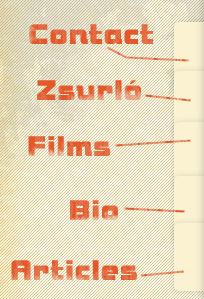
Such a Life … Like in the Movies
Nok Lapja Évszakok - 2005. June
by Marcsi Fodor
Few Hungarians have the distinction of having worked for the New York Times. But for 31-year-old Zsuzsanna Varga, success means not (just) having made it onto the television staff of one of the world's most renowned newspapers. It also means having produced her own documentary film after returning home to Hungary.
A real-life "ER"
"My first job experience in the documentary field was to work with the series called "Trauma: Life in the ER." This was New York Times Television's most successful program, the real-life version of the popular fictionalized "ER" series, and which recently began airing in Hungary, on the Discovery Channel. As a video journalist, my assignment was to shadow, camera in hand, a day in the life of a doctor and his patients. Thanks to the camera's small size, the participants soon forgot about the filming in progress, and I was able to get as close to the events as is possible." For eight years, "Trauma" was one of the most popular documentary series in the U.S. But filming it was a grueling task for us on the staff, since we never got a breather. Even when the doctors finally took a coffee break, we would take that opportunity to chat a little with the patients and their families.
The first patient
"I'll never forget my first patient, a young butcher who, in a workplace accident, cut off the top digits of his middle and ring fingers. He went into shock, and as he arrived at the hospital he couldn't even talk. He forgot to bring the severed finger parts with him - his co-workers brought them afterwards in a paper cup full of ice. The surgeons, in a heroic five-hour operation, were able to reattach the fingers. Later, I visited the young man on several occasions, and we talked a great deal. I was there when the doctor examined his fingers for the first time after the operation, and I was also there the first time the patient succeeded, with the physical therapist's help, in moving his fingers. It was also quite an experience when he thanked me for helping him recover - he considered me one of the medical team who fought to save his fingers."
Culture Shock
But how did Zsuzsanna get to the U.S. in the first place? As a recent college graduate, she applied for the U.S. government-funded Fulbright scholarship, which she won the first time she applied - an impressive achievement in the eyes of her American friends, who know that a Fulbright is a rare honor and a highly prized career move for such a young professional.
But the experience abroad had its ironic touches. On her first day at U.C. Berkeley, she attended an informational session organized for foreign students. The speaker explained that when coming to a new country, the foreign students would no doubt have many unfamiliar and strange experiences that may be hard to digest. "This is called culture shock," explained the speaker brightly. Culture shock can cause feelings of depression or timidity at first, the speaker said, but not to worry - you'll all get over it. Zsuzsanna waited and waited for culture shock to hit - it never did, until she returned home to Hungary. "Doctors in the U.S. are proud of their work - they want to demonstrate their skill. When I came home, my mother's illness brought me into the world of hospitals in Hungary, and the difference from the U.S. was shocking. For this reason, I'd never do a documentary focusing on our health system. What would I film? The overburdened, overworked Hungarian doctors incapable of communicating with their patients? The filthy washrooms in the hospitals?
Ideas galore
"Making a film is a team effort, and I like working with others," says Zsuzsanna enthusiastically. "If someone has a good idea, and someone else has another one, then the ideas don't just add up - they feed off each other and increase exponentially!" It was just such a creative idea-session which sparked her newest film, "Once They Were Neighbours." Bori Kriza, a co-worker and sociologist by training, who later became the film's interviewer, perked up her ears when her elderly grandmother began to say, on several occasions, how terrible it was to see the deportation of the Jews in 1944, and how no one did anything to stop it. This was the seed for the documentary: what do those people, whose immediate neighbors were deported, remember about the Holocaust? How did they see and react to the atrocities?
"The film's opening was a real success. I hope that the audience will continue to be affected by the film, to continue thinking about it, because the witnesses interviewed in the film talk about events that sadden us to this day; and the way they talk about these things still makes us shudder."
Biography
1973: Born Budapest, Hungary
1998: Degrees in Media Studies and Hungarian Studies from Budapest's ELTE
University
2000: Master's degree in documentary filmmaking, U.C. Berkeley
2001-2002: Employed as videojournalist at New York Times Television
2002: Wins award for Best Short Documentary Film at Atlanta Film Festival

